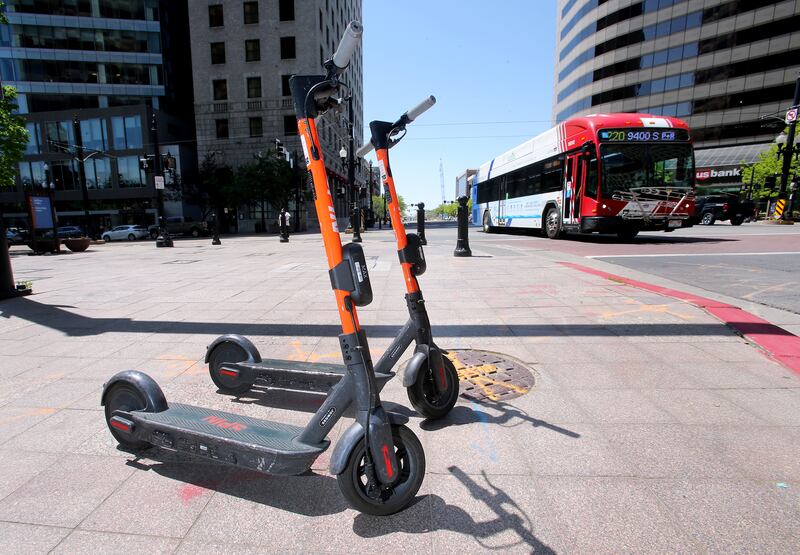SALT LAKE CITY — The capital city’s long-running effort to institute new rules to govern the use of rentable electric scooters seems no closer to fruition following a recent meeting at which City Council members and administration officials began and ended at loggerheads.
Resident complaints about the misuse of the scooters followed closely on the heels of their first appearance on the streets of Salt Lake City two years ago next month. And issues have only been exacerbated as more vendors have shown up and collectively, before pandemic issues arose, were distributing thousands of the two-wheelers around the city each day.
Last Tuesday, discussion of an ordinance proposal that’s been under construction for well over a year was on the Salt Lake City Council’s work session agenda. But instead of advancing to a formal meeting for a vote, the council asked for further work from the administration of Mayor Erin Mendenhall after an impasse arose over which new rules should be included in a new ordinance and which would be better addressed in contracts with e-scooter vendors.


Council Chairman Chris Wharton said issues with e-scooters are easily the No. 1 complaint he hears from his constituents in District 3, which includes the Avenues, Capitol Hill, Federal Heights and Marmalade neighborhoods.
“Let me be very, very clear,” Wharton said during the discussions. “What I want for my constituents is ... slower speeds, strict enforcement on sidewalks, collecting fees that recoup every and any losses to the city.”
Establishing a competitive bidding process that would whittle the current five vendors down to one or two as well as establishing fees that would compensate the city for the time and money that’s eaten up by various scooter-related issues are addressed in the ordinance. But other solutions like establishing variable scooter speed limits for different areas, creating clear liability for vendors and riders about illegal conduct and stipulations for vendor self-policing would have been part of operating agreements.
Incidents between scooter riders and pedestrians have been the bane of the operations since the first vendor launched in Salt Lake City in June 2018. Emails obtained in a Deseret News records request in previous coverage revealed scores of accounts in emails to Salt Lake City from pedestrians who experienced encounters with e-scooter riders.
“Every time we walk now, we have close encounters with electric scooters,” wrote one downtown resident who lives near City Creek. “Especially when they silently come from behind us. It is very frightening for us to be so vulnerable to accidents caused by these scooters.”
Alongside the negative issues related to sidewalk scooter riding, polling done by the city reflects a high level of enthusiasm for the two-wheelers by those who have ridden them. The systems operate via smartphone apps that allow users to locate and rent the vehicles. The scooters are designed to travel at no more than 15 mph.
While some see the vehicles as simply the latest recreation fad, city and regional transportation officials say the scooters are a great solution to solving so-called first-mile/last-mile transit connections and, according to Salt Lake City’s surveys, a third of riders are using them to commute.
City Transportation Director Jon Larsen explained last week that while e-scooter vendors currently only need to secure a business license and sign a temporary operating agreement that details things like maximum allowable vehicles and where they can be deployed, the contract process called for in the ordinance proposal fundamentally changes the landscape.
“I really believe having that competitive process will help us make some progress on some of the issues ... like sidewalk riding and scooters being parked in inappropriate places,” Larsen said. “Having only one or two vendors that have gone through a competitive process will allow us to treat this more like a partnership ... and work with those vendors to tackle some of these challenges.”
The ordinance proposal also includes a pathway to new fees for e-scooter vendors. If adopted, that could lead to annual charges for e-scooter businesses in Salt Lake City that range from $130,000 to $176,000 per 1,000 vehicles. The city is limited by state statute to only assess fees that represent actual cost recovery and can’t make money on the charges.
The best method by which to enforce new rules also appears to be an unresolved issue. While city parking enforcement personnel could be tapped to start citing illegal scooter riding, acting director of Salt Lake City Public Services Lorna Vogt told the council on Tuesday that no one had “come up with a mechanism to catch (riders) in violation.” While third-party vendors are available who could assume responsibilities like policing for and impounding improperly parked vehicles, they wouldn’t have citation-writing authority. Additionally, using a city parking enforcement officer to monitor scooter riders would require beefing up the operation’s budget, according to Tuesday’s discussion.
For now, the e-scooter can is being kicked down the road. Wharton said he’d like to see the administration come back with ideas on what rules could be lifted from the potential contracts and included in the ordinance. He also wanted assurances that the process allowed for some council sway in those contract negotiations.
With the city’s budget deliberations on the docket for the council in coming weeks, Wharton said the body would be ready to revisit the e-scooter conversation sometime in June.




